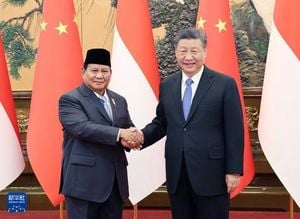Vietnam has recently emerged as a formidable player on the global economic stage, bolstered by sustainable growth strategies and dynamic investment opportunities. A new report released by the European Chamber of Commerce in Vietnam (EuroCham) shows the country’s Business Confidence Index (BCI) for the fourth quarter of 2024 reached 61.8 percent, up significantly from 46.3 percent during the same time last year. This increase highlights Vietnam’s growing appeal as a destination for foreign investors, particularly from Europe.
Bruno Jaspaert, the chair of EuroCham Vietnam, noted, "This signals an improving business climate," pointing out the numerous favorable policies implemented by the government, including tax incentives, support for large-scale investors, and encouragement for the growth of small- and medium-sized enterprises (SMEs). Despite its current advantages, Jaspaert pointed out areas where improvements could be made to sustain momentum.
With the threat of inflationary pressures, supply chain disruptions, and geopolitical uncertainties looming on the horizon, it’s clear Vietnam faces significant challenges. Regulatory issues, particularly around customs and legal frameworks, could slow down progress if not addressed swiftly. To combat these concerns, it is pivotal for Vietnam to streamline regulations and improve clarity surrounding administrative procedures to facilitate smoother business operations.
Meanwhile, Vietnam's fruit and vegetable export sector is also thriving. According to data, the country recorded over $4 billion from fruit exports to China alone, marking a 26 percent increase and placing it firmly as the second-largest supplier of fruits and vegetables to China, trailing only Thailand, which saw declines due to adverse weather conditions. The Vietnam Fruit and Vegetable Association believes with proper measures, Vietnam could soon surpass Thailand to become China’s primary supplier.
Despite this growth, challenges persist, particularly impacting the durian market, which makes up nearly half of Vietnam's total fruit exports. Recent amendments to safety inspections by the Chinese government have added pressure, highlighting the need for compliance with new health standards. General Secretary Nguyen Phu Trong has emphasized the need for manufacturers to adhere to regulations and invest in product quality, which are key for Vietnam’s ambitions for achieving $8 billion worth of fruit exports by 2025.
Professor Carl Thayer, from the Australian Defence Force Academy, echoed these sentiments during recent interviews commemorative of the 95th anniversary of the Communist Party of Vietnam (CPV). He praised the leadership of General Secretary Trong for steering Vietnam through turbulent times with sustained economic growth averaging 5.5 percent from 2011 to 2023, alongside significant strides against corruption. Thayer observed, "Vietnam is on the brink of entering a new era of growth," underscoring the pivotal need to modernize the production apparatus to fully capitalize on the Fourth Industrial Revolution.
Thayer posed the necessity for Vietnam to become a significant player within the global supply chain for high-tech products, pushing for investment to develop local capacities. He articulated the potential foreshadowing Vietnam’s role as a major destination for technology products such as computer chips and electric vehicles. His assertions resonate with the recent expansion endeavors of companies like NVIDIA, which have chosen to invest heavily within Vietnam, seeking to tap its rapidly growing technology sector.
Looking toward 2025, the Vietnamese government is proactively implementing policies to boost the AI sector, including drafting new regulations to create a supportive environment for digital technology investments. The upcoming Digital Technology Industry Law, slated for completion by mid-2025, promises various incentives for technology companies, effectively paving the way for innovation and attracting investors eager to gain from Vietnam's burgeoning market.
Jensen Huang, the CEO of NVIDIA, has recognized Vietnam as a desirable locale for R&D centers, following the establishment of projects within ASEAN aimed at leveraging the country's skilled labor force. He stated, "We believe Vietnam is an ideal place for NVIDIA to develop R&D centers and build a strong AI ecosystem here." This recognition from such a prominent figure signals significant opportunities for technological advancement.
Vietnam's government also plans to focus on regulatory frameworks to govern AI operations and ensures responsible research and development. The forthcoming legal frameworks are expected to not only boost investment but also address concerns surrounding innovation and ethical AI practices. These measures will bolster confidence among foreign investors perusing the Vietnamese tech market.
To sum up, as Vietnam ventures forward, the interplay between effective leadership, strategic investments, and adaptive regulatory measures will play pivotal roles. Emphasizing efficiency and reducing red tape could enable the country to secure and amplify its position within the global economy, ensuring both resilient growth and sustainable development.



